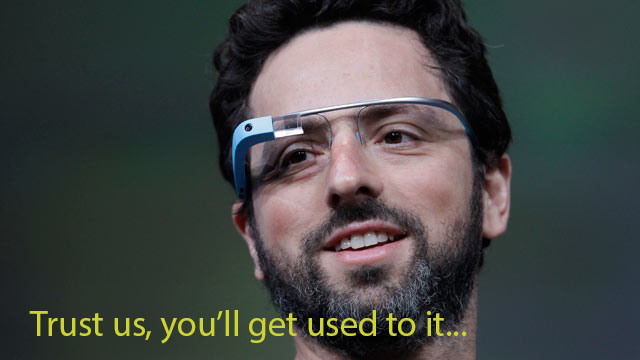On the surface the questions that Congress are asking about Google Glass seem to be all about protecting individual privacy. After all you have the right not to have your image captured and used by someone else without your permission. There are also laws that prevent taking pictures of minors without parental consent. So what do you do with a technology that is capable of that in any situation? How do you prevent someone with malicious intent from getting the technology and using it? There are many questions about this type of technology that need to be answered. Not the least of these questions is; is this a technology that needs to be made? What purpose does it serve? Sure Google Glass is pretty cool, but does it really bring anything to the table besides the “cool” factor?
I know I would not be comfortable talking to someone with Google Glass on as I would never know if they were recording our conversation or not. This is not, as Eric Schmidt put it, “people who are afraid of change or who have not figured out that there will be an adaptation of society to it,”. This is me not wanting someone to record my conversations. Everyone has that right and making a technology like this pushes the limits of acceptable social interaction. If I stood there with a camera in my hand and recorded everything that someone said it would be considered rude, making the camera smaller and putting it on a pair of glasses does not change this. Does Google really think that we should change basic courtesy?
Putting aside the ridiculous notion that society should change to make recording others actions acceptable, let’s get back to Congress. We all know that Congress has done a lot of sabre rattling at Google, Facebook and others over privacy. However they have yet to do anything real about it. In fact they have acted in a manner that shows they are not exactly in tune with protecting your privacy at all. There is nothing like drafting a law that makes it legal to share personal information as long as you can claim it is about cyber security. Also Congress has not done anything about the violations of privacy that Google Street View brought about. They have also failed to stop Facebook or cellular providers from their many violations. How can they possibly be interested in our privacy now that Google Glass is around?
One possible reason for this new found interest could actually be a real concern for security. A small portable and innocuous device that can feed information to a user and record video could pose a threat to the security of many places (including schools). These devices are perfect for gathering intelligence for potential attack or criminal activity. Does this mean that Congress is considering security in their questions about Google Glass? Again we think that this is not quite the reasons they are interested in Google Glass. Looking over the articles and some of the concerns from Congress there is one factor that is missing from the equation and it is one that should be on everyone’s mind. Over the last few years the US Congress has buddied up with the Copyright lobby and worked very hard to protect their interests. We see the new “concern” as taking care of a new technology before it gets out of hand.
When the cell phone first came out with the ability to record video, the MPAA and others missed the chance at getting these devices classified properly. They did not see it as a threat because the quality was so poor and the recording capacity was very limited. Now we have phones that can capture Full 1080P video and have enough storage space to get a whole movie. However it is too late to reclassify these devices so they have had to develop other technologies to spot people using them in the theaters. Now imagine their concern about a device like Google Glass. Sure it is not capable of high-resolution recording and does not have large storage capacity, but that is now. What happens when 1080p and house of recording come to devices like Google Glass? Will they be able to identify people that are using them? Movie theaters cannot tell people they have to remove their glasses before they watch a movie and the technology behind Google Glass is sure to get smaller and more powerful.
Make no mistake, there are members of Congress that are very concerned with personal privacy and are working to ensure that we can keep some of it in the future. The problem is that their voices are small and to get anything done they have to make deals with people that are much more concerned with what the MPAA and other copyright holders want so they can get the next round of funding. You will not see this on the surface, but we are sure that the topic of intellectual property will show up in their dialog very soon. In the meantime we wonder if the real issues about personal privacy will get pushed aside and ignored as we are all expected to adjust to the possibility of always being recoreded…
What do you think about Google Glass? Tell us in our Forum




